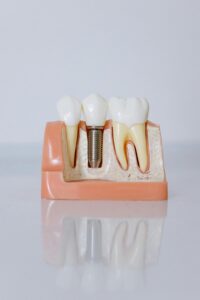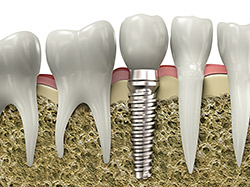Table of Contents
Dental emergencies can be distressing and require immediate attention. At Dorset Dental in Scarborough, we’re equipped to handle a variety of dental emergencies.
This guide will discuss the seven most common types of dental emergencies, how to handle them, potential treatments, and provide examples of each.
1. Toothache
Toothache is a common dental emergency that can be caused by various factors such as tooth decay, gum disease, an abscess, or a chipped or broken tooth. For example, you might experience a toothache if you have a cavity that has reached the nerve of your tooth, causing intense pain.
If you’re experiencing a toothache, it’s crucial to seek emergency dental care immediately. Treatment may include a filling, root canal, or extraction, depending on the cause of the toothache.
2. Chipped or Broken Teeth
Chipped or broken teeth can result from biting down on hard food, a sports injury, or a fall. For instance, you might chip a tooth while eating popcorn and accidentally biting down on an unpopped kernel.
If you have a chipped or broken tooth, avoid eating on that side of your mouth and avoid hot or cold foods and beverages. At our emergency dental clinic, we may repair the tooth with a filling or crown. In severe cases, a root canal or extraction may be necessary.
3. Knocked-Out Tooth
A knocked-out tooth is a serious dental emergency. For example, a tooth might be knocked out during a sports game if a ball or another player hits your face. If your tooth gets knocked out, try to put the tooth back in the socket if possible. If not, store it in a glass of milk or water and get to Dorset Dental immediately. Acting quickly can increase the chances of saving the tooth.
4. Dental Abscess
A dental abscess is a pocket of pus that forms due to a bacterial infection. For instance, if you have severe tooth decay or gum disease, an abscess can form, causing pain and swelling. If you suspect a dental abscess, see an emergency dentist at Dorset Dental immediately.
Treatment may involve draining the abscess and getting rid of the infection with root canal treatment or tooth extraction. Antibiotics may also be prescribed to help fight the infection.
5. Lost Filling or Crown
A lost filling or crown can expose the sensitive part of your tooth, causing pain and sensitivity. This can occur due to decay underneath the filling or crown or due to the wear and tear of the restoration. For example, you might lose a crown while eating sticky food.
If your filling or crown falls out, schedule a dental appointment at Dorset Dental as soon as possible. Your dentist will need to replace the filling or crown to protect your tooth and prevent further damage.
6. Broken Orthodontic Wires
Broken wires from braces can cause discomfort and even injury to the mouth’s soft tissues. For instance, a wire might break or stick out if you eat hard or crunchy food. If a wire breaks or sticks out, try to push it back into a comfortable position using the eraser end of a pencil. If that’s not possible, cover the end with orthodontic wax or a piece of gauze until you can get to the dentist. Your orthodontist will need to repair or replace the broken wire.
7. Severe Tooth Sensitivity
While some tooth sensitivity is common, severe or sudden tooth sensitivity can be a sign of a cracked tooth, gum disease, or tooth abscess. For example, you might experience severe sensitivity when you drink a hot beverage or eat ice cream. If you experience severe tooth sensitivity, especially if it’s accompanied by pain or a fever, it’s important to seek emergency dental care.
Treatment will depend on the cause of the sensitivity but may include a root canal, gum disease treatment, or treatment for a tooth abscess.
Key Takeaways
- Dental emergencies require immediate attention to alleviate pain and prevent further complications.
- The seven most common dental emergencies include toothache, chipped or broken teeth, knocked-out tooth, dental abscess, lost filling or crown, broken orthodontic wires, and severe tooth sensitivity.
- If you’re experiencing a dental emergency, it’s crucial to seek professional help immediately. Dorset Dental in Scarborough is equipped to handle a variety of dental emergencies.
Frequently Asked Questions
Dental emergencies refer to any situation where there is an immediate need for dental treatment or care to alleviate pain, reduce swelling or bleeding, and prevent further damage to the teeth, gums, or mouth.
The most common dental emergencies include painful toothache or sore tooth, chipped or broken tooth, knocked-out or avulsed tooth, loose or dislodged tooth, and soft tissue injuries in the mouth like cuts, lacerations, and bleeding gums.
Yes, it is essential to visit the dentist as soon as possible for emergency dental treatment or dental restoration to prevent the dental problem from worsening or leading to other complications that may affect your oral health and overall well-being.
Depending on the type and severity of the dental emergency, your dentist may be able to put the knocked-out tooth back in its place, use an ice pack or cold compress to reduce swelling, apply dental restoration to fix the tooth, or provide over-the-counter pain relievers and antibiotics to alleviate pain and prevent infection.
If you have a chipped tooth, you should call your dentist or emergency dental office right away to schedule an appointment for emergency dental treatment. In the meantime, rinse your mouth with warm water, use an over-the-counter pain reliever, and apply a cold compress to reduce swelling.
Yes, a loose tooth is considered a dental emergency because it may indicate a serious dental problem that requires immediate attention from a dentist. Your dentist may be able to reinsert the tooth back in its place or provide dental restoration to fix the tooth.
There are over-the-counter pain relievers, cold compresses, and dental floss that can help alleviate pain and reduce swelling for some dental emergencies. However, it is always recommended to see your dentist or emergency dental office for proper diagnosis and treatment of dental problems.
If a tooth gets knocked out, try to reinsert the tooth back in its place without touching or damaging the roots. If that is not possible, keep the tooth in a container of milk or saliva and see your dentist immediately for emergency dental treatment.
You should go to the emergency room for dental problems that involve severe pain and bleeding and may require immediate attention from a medical professional. However, for most dental emergencies, visiting the dentist as soon as possible is the best course of action.
Practicing good oral hygiene habits like brushing and flossing regularly, visiting the dentist for routine check-ups and cleanings, wearing protective gear when playing sports, and avoiding hard and sticky foods can help prevent dental emergencies.
- Regular dental check-ups can help prevent dental emergencies by catching and treating dental issues early.
- Trust Dorset Dental in Scarborough to provide the immediate and professional care you need during a dental emergency.

DONT'T DELAY BOOK TODAY!
The Scarborough Dentist You Can Trust 🦷
Book now to remove all toothaches and give yourself the best smile you’ve ever had!
Latest Posts

Lost a Tooth During Black Friday Shopping? What to Do — and How Dorset Dental Can Help
Black Friday shopping in Scarborough can be hectic. With crowded stores, tight spaces, and the rush to snag the best deals, accidents happen — including unexpected dental injuries. If you end up with a knocked-out tooth, knowing what to do in the moment can make all the difference. As your trusted Scarborough Dentist and Family Dentist, Dorset Dental is here to guide you through the steps and provide fast, reliable Emergency care when you need it most. How Does a Black Friday Accident Lead to a Knocked-Out Tooth? You’d be surprised how often it happens: A sudden elbow in a packed checkout line Slipping on a wet mall floor A shopping cart collision Rushing during door-crasher sales No matter how it occurs, a knocked-out tooth is a true dental emergency — but with quick action, the tooth may still be saved. What To Do Immediately After a Tooth Gets Knocked Out 1. Stay Calm — Every Minute Counts Your best chance of saving the tooth is to see a dentist near me within 60 minutes. 2. Locate the Tooth Pick it up by the crown only. Avoid touching the root, as this can damage delicate tissues. 3. Rinse Carefully If the tooth is dirty, rinse briefly with milk or saline.Do not scrub or use soap. 4. Try to Put the Tooth Back Gently place it back in the socket and bite down softly on gauze.This helps preserve the root. 5. Keep It Moist If Reinsertion Isn’t Possible Place the tooth in: Milk A tooth preservation kit Inside your cheek Never let it dry out. 6. Call Dorset Dental Immediately We reserve space for Emergency dental visits.Call 416-261-2946 while you are on the way. How Dorset Dental Treats a Knocked-Out Tooth At Dorset Dental — your community Scarborough Dentist — we will assess the tooth and determine the best treatment: ✔ Reimplantation If the tooth is viable, we can carefully secure it back in place. ✔ Splinting We stabilize the tooth so it can heal properly over the coming weeks. ✔ Root Canal Treatment Often recommended after reimplantation to ensure long-term success. ✔ Replacement Options If the tooth cannot be saved, our Family Dentist team offers: Dental implants Bridges Cosmetic restorations We’ll help you choose the option that best restores your smile. Why Choose Dorset Dental in Scarborough for Emergency Care? Trusted Family Dentist serving the Scarborough Bluffs community Fast, reliable Emergency dental appointments Modern technology Compassionate, experienced team Convenient location at 119 Dorset Road Whether you’re searching for a dentist near me or need urgent help, Dorset Dental is here to support you. Final Thoughts A Black Friday shopping mishap doesn’t have to mean losing your smile. Quick action — and a trusted Scarborough Dentist — can make all the difference. If you or a loved one experiences a dental Emergency, call Dorset Dental right away at 416-261-2946. Our team is ready to help you get back to smiling with confidence. 0/5 (0 Reviews)

How a Dental Cleaning Supports Heart Health — And Why You Should Book Before Year-End
Most people know that a Dental Cleaning helps keep teeth bright and gums healthy — but many don’t realize it can also help protect your heart health. At Dorset Dental, your trusted Scarborough Dentist, we care about your oral health and your overall well-being. With the end of the year approaching, now is the perfect time to schedule your cleaning and maximize your dental insurance before your benefits reset. The Mouth–Heart Connection Your oral health and heart health are deeply linked. Research shows that gum disease (periodontal disease) is associated with an increased risk of heart problems, including heart disease, clogged arteries, and stroke. Here’s why: 1. Inflammation Travels Gum disease causes inflammation in the mouth. When untreated, that inflammation can spread through the bloodstream and contribute to inflammation in blood vessels — a major risk factor for cardiovascular disease. 2. Bacteria Enter the Bloodstream Harmful bacteria from infected gums can enter the bloodstream and attach to blood vessels, potentially contributing to plaque buildup and reduced blood flow. 3. Shared Risk Factors Lifestyle factors like poor diet, smoking, and stress affect both gum health and heart health. This makes routine dental care essential for your overall well-being. Why Regular Dental Cleanings Matter A professional Dental Cleaning removes plaque and tartar buildup that you cannot eliminate with brushing or flossing alone. Regular cleanings help: Reduce gum inflammation Prevent gum disease Lower harmful oral bacteria Promote healthier blood vessels and circulation At Dorset Dental, we provide gentle, thorough cleanings to help patients from Scarborough, the Bluffs, and surrounding communities maintain excellent oral and overall health. Use Your Dental Insurance Before It Expires Most insurance plans reset on January 1st — meaning unused benefits do not carry forward. Booking your dental cleaning now helps you: Maximize your dental coverage Prevent gum disease and support heart health Avoid the end-of-year rush and limited availability Start the new year with a clean, healthy smile If you haven’t used your 2025 cleaning or exam benefits yet, now is the best time to book. Visit Your Trusted Scarborough Dentist — Dorset Dental Whether you’re in Scarborough, the Bluffs, or nearby communities, Dorset Dental is here to support your health with comprehensive care and comfortable visits. 📞 Call us: 416-261-2946📍 119 Dorset Road, Scarborough, ON M1M 2S9💻 Book online anytime! 0/5 (0 Reviews)

Don’t Lose Your 2025 Dental Benefits — Schedule Your Appointment Before the Year Ends!
As the year comes to a close, life in Scarborough, especially around the Cliffside and Bluffs neighbourhoods, gets busy with holiday plans, family gatherings, and festive activities. But before you dive into the celebrations, don’t forget one important thing — your dental health! If you haven’t used your dental benefits yet, now is the perfect time to schedule your appointment at Dorset Dental in Scarborough before the year wraps up. 🦷 Why You Should Book Before December 31st Most dental insurance plans reset on January 1st, meaning any unused benefits for cleanings, exams, or treatments will not carry over into the new year. That means if you delay your visit, you could lose hundreds of dollars in coverage that you’ve already paid for through your premiums. At Dorset Dental, conveniently located near the Scarborough Bluffs and Cliffside Village, we want to help you maximize your benefits and keep your smile healthy and bright all year round. ✅ Use Your 2025 Benefits For: Routine cleanings and checkups Fillings, crowns, or other restorative treatments Whitening or cosmetic touch-ups before holiday photos Periodontal maintenance or gum care Orthodontic adjustments and follow-ups 📅 Appointments Fill Up Fast Our schedule fills quickly in November and December as patients in Scarborough, Cliffside, and the Bluffs area book last-minute appointments to use their benefits. To ensure you get a time that works best for you and your family, book your appointment as soon as possible. 💙 We’re Here to Help If you’re not sure what your insurance covers or how much of your benefits remain, our friendly team can help you review your plan and make the most of it. Don’t wait until it’s too late — your future self (and your smile) will thank you! 📍 Dorset Dental119 Dorset Road, Scarborough, ON M1M 2S9📞 Call us today: 416-261-2946 0/5 (0 Reviews)


